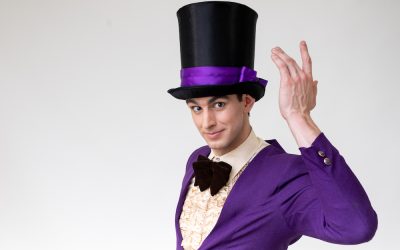
Andrew McNee’s performance as Mustard helps to ground this production. And Heidi Damayo is solid as Thai. (Photo by Mark Halliday)
Hold the Mustard.
On paper, it sounds like playwright Kat Sandler might have created an engaging world. Sixteen-year-old Thai has an imaginary friend, Mustard, whom she can see and talk to. Thai’s getting sick of Mustard hanging around all the time, but Thai’s mom Sadie soon starts seeing Mustard, too, and she needs him: Sadie’s husband Bruce left her a year earlier and she is brutally lonely.
Watching Mustard in the theatre, though, the storytelling feels incoherent. The script contains elements of naturalistic grit and fantastical darkness that never fully mesh with its whimsicality. Early on, Sadie attempts suicide, for instance, thinking that Thai is in the house. Sadie describes her attempt as a “cry for help.” Still, she’s selfish enough to risk her daughter finding her corpse? And I’m supposed to like this woman? In terms of storytelling, Sadie’s suicide attempt feels like a convenient and under-motivated plot point—and it blocks my emotional access to the piece.
Then there are the goons, Bug and Leslie, who exist on the same plane as Mustard. They show up to convince Mustard that he has to go to a place called the Boonswallow, which is a kind of sunless purgatory for discarded imaginary friends. Mustard doesn’t want to go, so—get this—they rip out his fingernails. This kind of brutality can work in fantasy—if it’s in an integrated world, as it is with the clowns Mump and Smoot, for instance, or if it speaks to an archetypal truth in a fairytale—but, in Mustard, it feels random and under-motivated.
Why, exactly, is it so important that Mustard end his relationship with Thai? Late in the action, playwright Sandler hints that Thai might prefer Mustard to her dad, which is, supposedly, unhealthy. But, from what we know of Bruce, Mustard is entirely justified when he calls Bruce a poop face. So the centre of the play feels hollow.
With his hyperventilating production, director Stephen Drover doesn’t help things out. The characters yell a heck of a lot. And some of the humour is coarse. When Sadie finds Thai in bed with her boyfriend, Jay, for instance, there’s a long sequence in which Jay stumbles about with his pants around his ankles and his bare bum sticking out of his underwear. It’s not hilarious.
Chirag Naik pushes particularly hard as Jay. And, bizarrely, Shekhar Paleja does almost nothing as Leslie, one of the goons. Brett Harris plays Bug, Leslie’s partner, with a Cockney accent and a weirdly perky malevolence. It works. But there’s barely a hint of presence, never mind eccentricity, in Paleja’s Leslie. Leslie wears sunglasses indoors, but that’s really not enough.
Fortunately, the cast also includes Andrew McNee (Mustard) and Jenny Wasko-Paterson (Sadie). At times, they both get caught up in the mania, but that’s Drover’s fault, not theirs. Beyond that, McNee is charmingly openhearted and mercurial. And, largely because Wasko-Paterson is such an emotionally resourceful performer—we don’t see nearly enough of her on Vancouver stages—the scene in which Mustard and Sadie open their hearts to one another is by far the most successful of the evening.
Still, it’s hard to find the burger in this Mustard.
MUSTARD By Kat Sandler. Directed by Stephen Drover. An Arts Club Theatre/Belfry Theatre co-production at the Granville Island Stage on Wednesday, September 16. Continues until October 20.
NEVER MISS A REVIEW: To get links to my reviews plus the best of international theatre coverage, sign up for FRESH SHEET, my free weekly e-newsletter.
And, if you want to keep independent criticism alive in Vancouver, check out my Patreon page. Newspapers are dying and arts journalism is often the first thing they cut. Fight back!





0 Comments